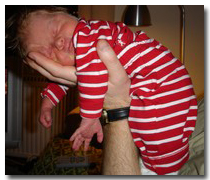
Breast milk is the perfect food for babies, serving up all the nutrients a baby needs at any given stage of life in exactly the right proportions. A toddler may be drinking from the same breast that he drank from as an infant, but there's an entirely different beverage on tap!
Breast milk is higher in cholesterol than formula. This may not sound like a good thing—after all, isn't cholesterol supposed to be bad for you? But studies of animals have indicated that early exposure to cholesterol may help prepare a baby's body to process cholesterol more efficiently during adulthood, thereby providing some measure of protection against heart disease.
Breast milk is packed with antibodies. This is because breast milk contains immunoglobulin A proteins, which line the baby's respiratory and intestinal surfaces, thereby protecting the baby against certain types of viral and bacterial agents during the period in his life when he needs such protection most—while his own immune system is still very immature. Not surprisingly, studies have shown that breast-fed babies are less likely to develop gastrointestinal infections, respiratory infections, middle ear infections, food allergies, tooth decay, pneumonia and meningitis than bottle-fed babies. Breastfeeding even improves the effectiveness of vaccines, which helps to ensure that your baby will get the ultimate boost from each of his booster shots.
Breast-fed babies are less susceptible to Sudden Infant Death Syndrome (SIDS) than bottle-fed babies. They also enjoy added protection against intestinal disease, eczema, certain types of heart disease, allergies, cancer and obesity—health benefits that last long after weaning.
Breastfeeding helps to promote normal development of the jaw and facial muscles. Bottle-fed babies are more likely to require orthodontic work than their breastfed counterparts.
Breastfeeding helps your uterus to contract after the birth, which reduces the amount of blood lost after the delivery and helps you to regain your pre-pregnancy shape more quickly.
Breastfeeding helps to suppress ovulation and consequently your menstrual periods. If you breastfeed exclusively, you probably won't menstruate for about six months after giving birth, and possibly even longer. In addition to avoiding the inconvenience of getting your period (to say nothing of the cost of all those tampons and pads), you will have the chance to build up your iron reserves once again, because you won't be losing the same amount of iron that you normally do when you're menstruating. The one benefit that you shouldn't count on, however, is built-in birth control. Breastfeeding is not a reliable method of contraception.
Breastfeeding helps you to burn your extra "baby fat" without dieting since breastfeeding a baby requires about 500 calories worth of energy per day.
Breastfeeding may help to reduce your risk of developing breast cancer and uterine cancer later in life.
Breastfeeding may reduce your risk of developing osteoporosis down the road. Some studies have found that older women who breast-fed during their child-bearing years face only half the risk of experiencing bone fractures as women who did not. What's more, the longer a woman spent breastfeeding, the lower her risk of fracture.
Breastfeeding is convenient. There is no best-before date to worry about, and your baby's food is always ready to serve! What's more, breastfeeding forces you to take regular breaks throughout the day—the very thing that a new mother should be doing.













